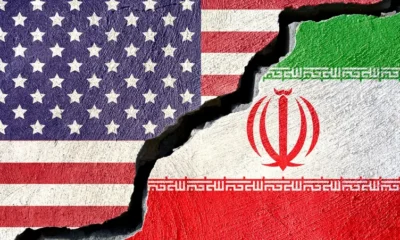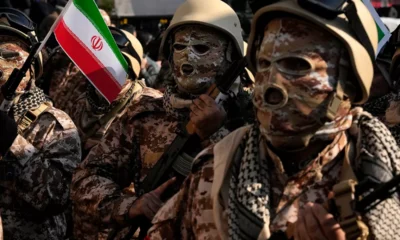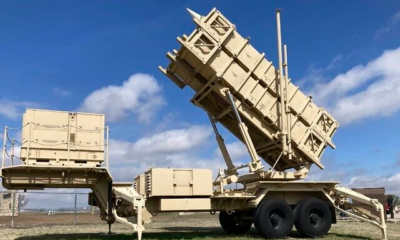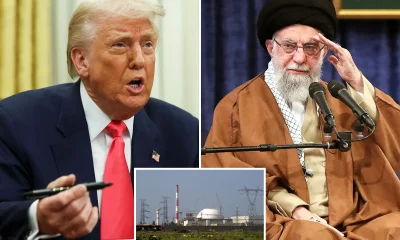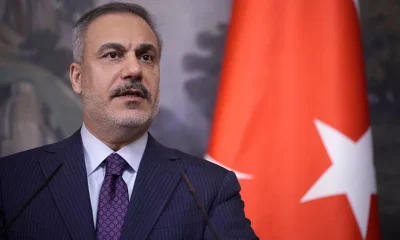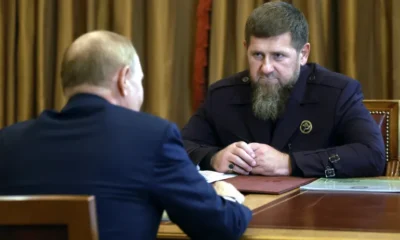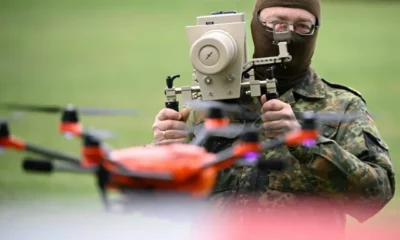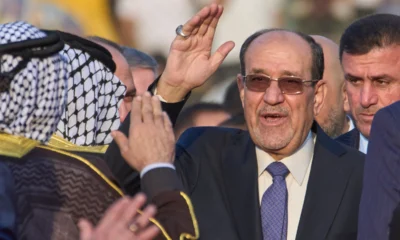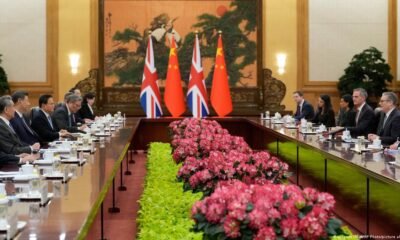Middle East
Russia’s Nuclear Secrets for Ballistic Missiles and a Mysterious Houthi Missile Attack

Geopolitical Machinations and Unanswered Questions from Central Israel
U.S. and British officials are sounding alarms over what could be a sinister pact between Russia and Iran, one that could dramatically shift the balance of power in the Middle East. The heart of the controversy? The ominous possibility that Russia, in exchange for Iranian ballistic missiles, has been sharing its nuclear secrets with Tehran. This chilling scenario emerged during high-stakes discussions between President Joe Biden and British Prime Minister Keir Starmer in Washington, as reported by the Guardian and Bloomberg. Their meeting unveiled a troubling convergence of military and nuclear ambitions, with Tehran racing towards its long-desired goal of building a nuclear bomb.
The allegations, if proven true, suggest that Russia, facing international isolation and a bloody conflict in Ukraine, has turned to Iran not only for military support but also to advance Iran’s nuclear ambitions. British sources have voiced grave concerns over this dangerous collaboration, highlighting a possible quid pro quo: Russian nuclear technology for Iranian missiles aimed at Ukrainian targets. This unsettling development could potentially enable Iran to make significant strides towards nuclear weaponization, a move that could destabilize the entire region.
Meanwhile, the situation took a dramatic turn with a missile attack from Yemen that struck central Israel early Sunday, setting off air raid sirens and igniting fears of escalating regional conflict. The missile, originating from Yemen’s Houthi rebels, landed in an open area, triggering a fire but causing no casualties. The attack, however, raises critical questions: Was it a cruise missile, which is notoriously difficult to intercept, or a ballistic missile, which should have been detected and neutralized by Israel’s advanced defense systems?
The mystery deepens as analysts speculate about the missile’s trajectory and the challenges faced by Israel’s defense systems. A cruise missile could have taken an indirect route, complicating detection efforts, while a ballistic missile would have been expected to be intercepted by systems like Arrow 2 or Arrow 3. The failure to intercept might indicate a serious lapse in Israel’s defense capabilities or a strategic oversight in identifying and neutralizing the threat.
The Houthi rebels, known for their aggressive stance against Israel and their recent threats of further retaliation, appear to be escalating their actions in response to past Israeli strikes. This missile attack could be their way of demonstrating continued defiance and capability, a move that has not only heightened regional tensions but also put Israeli defense mechanisms under intense scrutiny.
The implications of these events are profound. If Russia is indeed helping Iran advance its nuclear program while simultaneously arming its regional allies, the geopolitical landscape could shift dramatically. The question remains: will these revelations and the mysterious missile attack trigger a broader confrontation or lead to deeper diplomatic maneuvers? The answers, shrouded in secrecy and speculation, could reshape international relations and security strategies in the coming months.
In this geopolitical drama, one thing is clear: the stakes are rising, and the world is holding its breath as the drama unfolds.
Middle East
Trump vs. Maliki: Iraq Caught Between Sovereignty and Sanctions
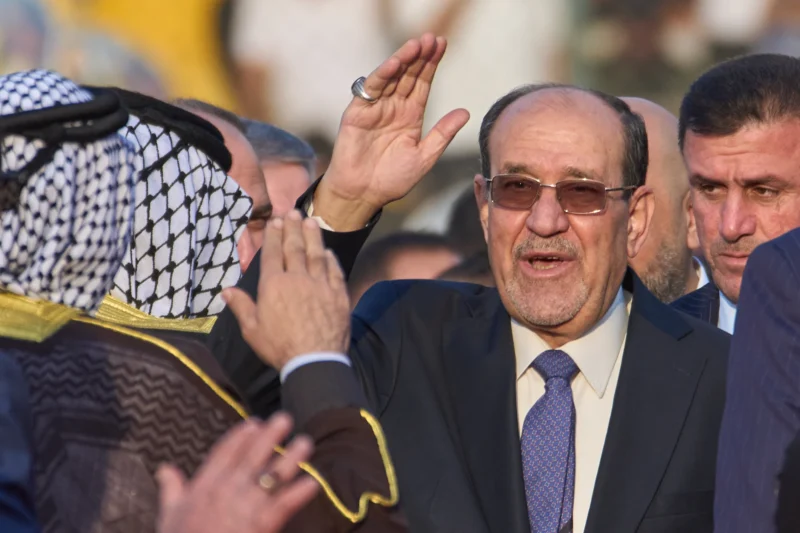
Washington is warning. Baghdad is pushing back. Iraq’s next prime minister could decide far more than its next government.
Former Iraqi prime minister Nouri al-Maliki has chosen defiance over retreat after U.S. President Donald Trump publicly threatened to withdraw American support for Iraq should Maliki return to power, thrusting Iraq’s fragile political transition into an openly geopolitical confrontation.
Maliki, formally nominated last week by the Shiite-dominated Coordination Framework, rejected what he called “blatant American interference” and framed Trump’s warning as a violation of Iraqi sovereignty. “We will continue,” he said, “out of respect for the national will and the Coordination Framework’s decision.”
Trump’s intervention was unusually direct. In a social media post, he blamed Maliki’s previous tenure for plunging Iraq into “poverty and total chaos,” warning that if Maliki returns, the United States would end its assistance, leaving Iraq with “ZERO chance of success, prosperity, or freedom.” The message was unambiguous: Maliki is unacceptable to Washington.
Behind the rhetoric lies a familiar fault line. U.S. officials view Maliki as closely aligned with Iran, and his last term, which ended in 2014, coincided with the rise of the Islamic State, which seized large swaths of Iraqi territory. Even before Trump’s public threat, members of the Coordination Framework received a written warning from U.S. Charge d’Affaires Joshua Harris, recalling that Maliki’s earlier governments were viewed “negatively in Washington.”
Iraq’s domestic politics have only deepened the uncertainty. Caretaker Prime Minister Mohammed Shia al-Sudani, whose bloc won the most seats in November’s parliamentary elections, stepped aside earlier this month, clearing the path for Maliki after both men competed for the Coordination Framework’s backing. A parliamentary session to elect a president — a prerequisite for appointing a prime minister — collapsed this week for lack of quorum, with no new date announced.
The impasse has emboldened armed actors. Leaders of Iran-aligned militias, including Kataib Sayyid al-Shuhada, denounced Trump’s comments as foreign meddling. Their rhetoric echoes a broader fear in Baghdad: that Washington could translate threats into financial pressure. Iraq’s foreign currency reserves are held at the U.S. Federal Reserve, giving Washington significant leverage through sanctions or restrictions on dollar access.
Analysts warn the economic consequences could be severe. Royal United Services Institute fellow Tamer Badawi argues Iraq “cannot afford” Trump following through, but cautions that Maliki’s troubles do not automatically clear the way for Sudani. Instead, he says, Maliki’s nomination may be a tactical gambit — drawing U.S. pressure and domestic resistance while opening space for a third, compromise candidate to emerge.
The irony is that cooperation between Washington and Baghdad continues even as the political temperature rises. The U.S. and Iraq have just completed another transfer of suspected Islamic State detainees from Syria to Iraqi custody, underscoring how security interdependence persists regardless of leadership disputes.
What makes this moment different is visibility. Past U.S. influence over Iraqi politics often operated through private channels. Trump has chosen public confrontation, transforming a domestic power struggle into a test of sovereignty versus survival.
For Iraq, the choice ahead is stark. Defying Washington may satisfy nationalist instincts but risks financial and diplomatic isolation. Yielding could preserve stability but deepen perceptions of external control. As parliament remains paralyzed and candidates jockey for position, the country is again caught between regional loyalties and global pressure — with its next prime minister poised to determine which cost Iraq is willing to pay.
Comment
When Pressure Comes, Putin Lets Iran Burn Alone
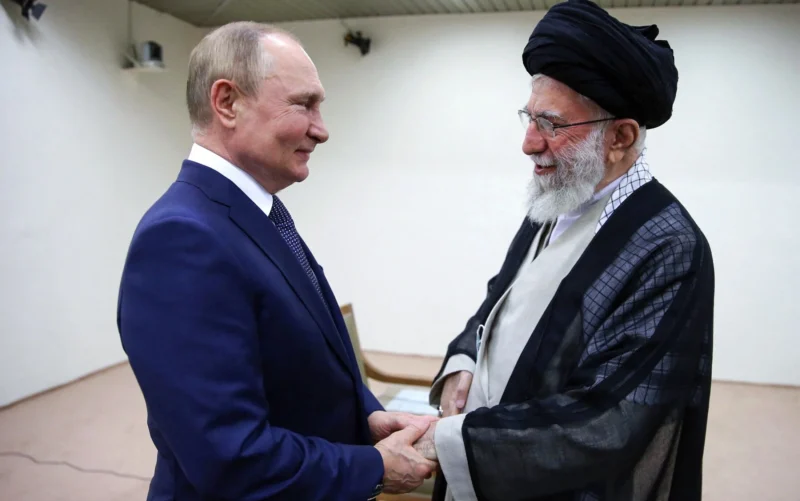
Putin’s Calculated Distance from Iran Exposes the Limits of Russia’s Alliances.
Alliances built on convenience rarely survive real pressure. The current standoff between Washington and Tehran has laid bare a quiet but telling shift: Vladimir Putin, long portrayed as Iran’s strategic patron, is now carefully stepping aside as the Islamic Republic faces one of its gravest moments in decades.
As President Donald Trump warns that a U.S. naval armada is moving toward the Gulf and openly hints that strikes on Iran remain an option, Moscow’s response has been conspicuously restrained. Russia’s foreign ministry has advised its citizens against traveling to Iran. Russian officials have offered mediation rather than protection. And the Kremlin has made no move suggesting it would place itself between Tehran and Washington.
This is not accidental. It is strategic abandonment.
For over a decade, Russia and Iran forged a partnership built on opposition to Western power. That relationship deepened after Moscow’s invasion of Ukraine, when Iran supplied Russia with Shahed kamikaze drones that helped sustain the Kremlin’s campaign against Ukrainian cities. In return, Tehran expected unprecedented military cooperation, including advanced aircraft and air defense systems.
Yet the partnership was always transactional, never existential.
Russia localized drone production by 2023, reducing its dependence on Iranian supply. China and North Korea now matter far more to Moscow’s war effort. And the collapse of the Assad regime in Syria in late 2024 — a regime jointly propped up by Russia and Iran — dealt a severe blow to their shared regional architecture.
Even their much-vaunted “comprehensive strategic partnership treaty” signed in early 2025 stopped short of any mutual defense obligation. That omission now looks deliberate. Russia wants flexibility, not entanglement.
The moment of truth came last summer when Israel and later the United States systematically dismantled Iran’s air defenses and struck its nuclear infrastructure — humiliating Tehran in full view of the world. Iranian envoys rushed to Moscow. They returned empty-handed.
Now, as protests sweep Iran and the regime faces mounting internal and external pressure, Putin has again chosen distance over loyalty. His priority is not Tehran’s survival. It is staying in Trump’s good graces as negotiations over Ukraine intensify. By letting the foreign ministry issue ritual condemnations while avoiding concrete commitments, Putin shields himself from consequences while signaling to Washington that Iran is expendable.
Even the limited Russian support visible — a handful of military cargo flights and vague arms assistance — falls far short of what would meaningfully alter Iran’s fate. Moscow cannot spare systems from Ukraine, and it will not risk escalation for a partner whose core survival is not tied to Russia’s own.
This moment exposes a deeper truth about Putin’s world: Russia’s partnerships are designed to be reversible. Loyalty flows upward, never reciprocally.
For Washington, this is an opportunity. Not merely to isolate Iran, but to demonstrate to Russia’s other partners that when pressure arrives, the Kremlin’s friendship has a sharp expiration date.
Putin’s silence today may echo far beyond Tehran.
Middle East
Trump Moves Warships as Iran Nuclear Tensions Return
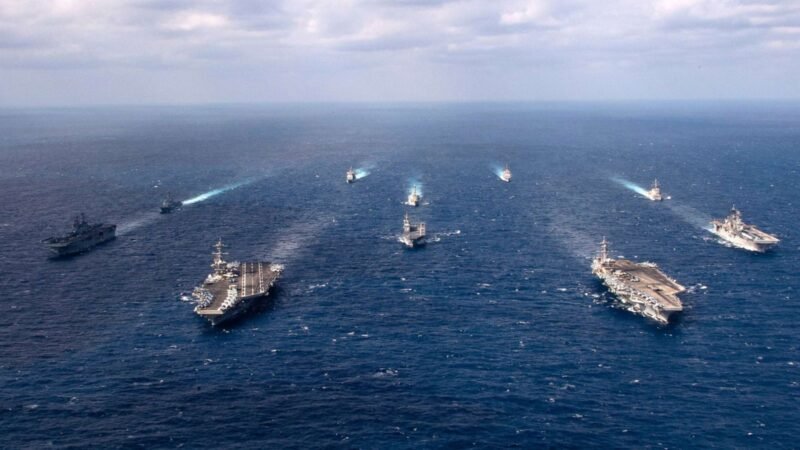
Trump Warns Iran on Nuclear Reset as U.S. Carrier Group Deploys to Middle East.
WASHINGTON / DAVOS — The United States is deploying a major aircraft carrier strike group and additional military assets to the Middle East as President Donald Trump warned Iran against resuming its nuclear program, signaling a renewed phase of pressure on Tehran amid lingering regional instability.
Two U.S. officials confirmed Thursday that the aircraft carrier USS Abraham Lincoln, accompanied by several destroyers and fighter aircraft, is moving toward the region from the Asia-Pacific. One official said additional U.S. air defense systems are also under consideration, reflecting heightened alert levels across U.S. military commands.
The deployment comes as Trump has sought to balance deterrence with restraint. Speaking Wednesday from Davos, Switzerland, Trump said he hoped to avoid further military action but made clear that any Iranian attempt to revive its nuclear program would prompt a swift response.
“They can’t do the nuclear,” Trump told CNBC. “If they do it, it’s going to happen again,” he added, referencing U.S. airstrikes on Iranian nuclear facilities carried out in June 2025.
Although U.S. officials emphasize the buildup is defensive, analysts note that similar troop surges preceded last year’s strikes on Iran’s nuclear infrastructure. The Pentagon has previously acknowledged keeping its military intentions secret during that operation.
Iran’s nuclear status remains murky. The International Atomic Energy Agency has not verified Iran’s stockpile of highly enriched uranium for more than seven months, despite guidelines calling for monthly inspections. Before inspections were disrupted, Iran was estimated to hold more than 440 kilograms of uranium enriched to 60 percent purity—near weapons-grade levels—enough material for roughly ten nuclear bombs if further refined.
Tehran is also under growing international scrutiny for its violent suppression of protests that erupted in late December over economic grievances. According to the U.S.-based Human Rights Activists News Agency (HRANA), at least 4,519 people have been killed so far, including more than 4,200 protesters. An Iranian official has acknowledged more than 5,000 deaths, including security personnel.
Trump had earlier threatened military intervention over the killings but has softened his rhetoric in recent weeks as protests subsided. However, the military deployment signals Washington remains deeply wary of both Iran’s internal instability and its nuclear ambitions.
The arrival of U.S. warships now places additional pressure on Tehran at a moment when diplomacy, deterrence, and military preparedness are again converging in the Middle East.
Middle East
Gaza: Trump Chairs Board as Turkey and Qatar Enter Post-War Governance
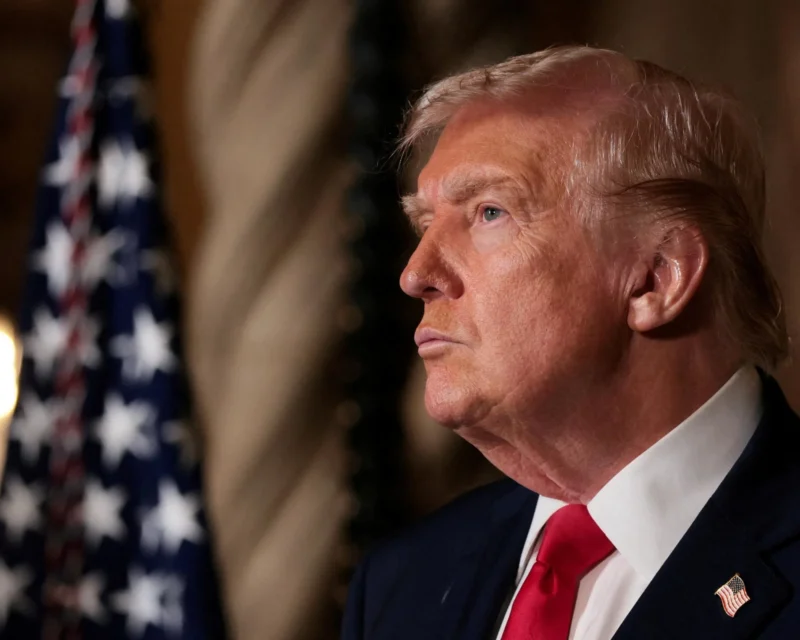
White House Confirms Gaza Board of Peace With Turkish and Qatari Representatives as Trump Leads Transition Framework.
The White House has formally unveiled the architecture of a new post-war governance system for Gaza, confirming the creation of a Gaza Board of Peace (BoP) chaired by Donald Trump and supported by a multinational executive and security structure that includes Turkey and Qatar.
The move signals a decisive shift away from interim crisis management toward a long-term, externally supervised transition designed to dismantle Hamas, rebuild Gaza’s institutions, and stabilize daily life in the enclave.
According to the announcement, the BoP will serve as the political authority overseeing Gaza’s reconstruction and demilitarization. Its seven founding executive members include Marco Rubio, Steve Witkoff, Jared Kushner, Tony Blair, Marc Rowan, Ajay Banga, and Robert Gabriel—an unusually corporate-heavy lineup reflecting Washington’s emphasis on technocratic governance and economic reconstruction.
Operational authority inside Gaza will rest with a newly formed National Committee for the Administration of Gaza (NCAG), led by technocrat Ali Sha’ath, tasked with restoring public services, rebuilding civil institutions, and laying the groundwork for self-sustaining governance. Former UN Middle East envoy Nickolay Mladenov will act as High Representative on the ground, linking the political board with the technocratic administration.
Security will be enforced by an International Stabilization Force (ISF) commanded by Jasper Jeffers, whose mandate includes demilitarization, protection of reconstruction efforts, and securing humanitarian corridors.
Notably, the Gaza Executive Board introduces regional stakeholders directly into Gaza’s governance framework. Confirmed members include Hakan Fidan, Qatari diplomat Ali Al-Thawadi, Egypt’s General Hassan Rashad, UAE Minister Reem Al-Hashimy, Yakir Gabay, and Sigrid Kaag.
Trump framed the initiative as backing a “Palestinian technocratic government” during Gaza’s transition—language that carefully avoids sovereignty questions while asserting external control over security and reconstruction.
Strategically, the framework reflects three realities: Hamas is being formally removed from governance; Gaza’s future is being internationalized rather than Arabized alone; and Turkey and Qatar—long accused by critics of shielding Hamas politically—are now being absorbed into a US-led structure rather than operating independently.
For the region, this is not merely a rebuilding plan. It is a reordering of power, accountability, and influence in post-war Gaza—designed in Washington, enforced internationally, and managed by technocrats under close supervision.
Middle East
Arab States Pressured Trump to Halt Planned Strikes on Iran
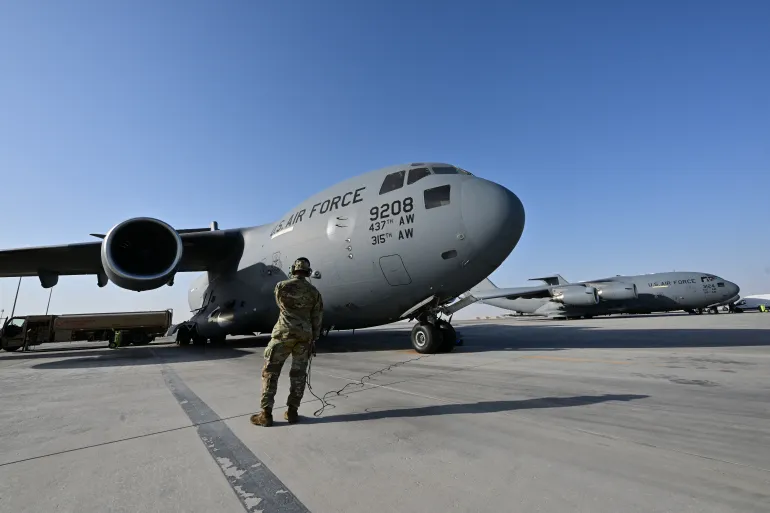
A rare and coordinated intervention by America’s closest Middle Eastern allies helped pull President Donald Trump back from the brink of military strikes against Iran, exposing deep regional fears of a war that could spiral beyond control.
Saudi Arabia, Qatar, Turkey and Oman mounted an intense last-minute lobbying campaign, warning Washington that an attack on Iran would ignite a region-wide conflict with unpredictable consequences. Their message was blunt: escalation would not remain contained, and US bases, shipping lanes and regional stability would all be at risk.
Saudi Arabia’s stance carried particular weight. Riyadh quietly refused to allow US aircraft to use its airspace for any strike, signaling a firm red line despite its historically tense relationship with Tehran. Saudi Foreign Minister Prince Faisal bin Farhan followed up with calls to counterparts in Iran, Oman and Turkey, underscoring a regional push to contain the crisis diplomatically.
The lobbying reflects a broader shift. While Gulf states deeply distrust Iran’s proxy network and regional ambitions, they are equally alarmed by the prospect of chaos triggered by US military action. Disruption to Gulf shipping routes, missile retaliation against US bases, and internal instability across the region remain overriding fears.
Iran, for its part, has worked to soften its isolation. Foreign Minister Abbas Araghchi has intensified outreach to Arab capitals, framing Tehran as a lesser threat to regional stability than Israel and portraying diplomacy as the only viable off-ramp. That message has found cautious listeners, especially after past Israeli strikes risked dragging Gulf states into conflicts not of their choosing.
The episode also exposed US vulnerabilities. As tensions peaked, Washington withdrew key personnel from its Al Udeid airbase in Qatar, highlighting how America’s vast military footprint can become a liability if deterrence fails.
For now, diplomacy has bought time. But the underlying fault lines remain. The Gulf states’ intervention did not signal trust in Iran—it signaled fear of uncontrolled war. And it sent a clear message to Washington: any move against Tehran will no longer be a unilateral decision, but one that reshapes the entire Middle East.
Comment
Iran’s Killing Machine Accelerates as Trump Issues Final Warning
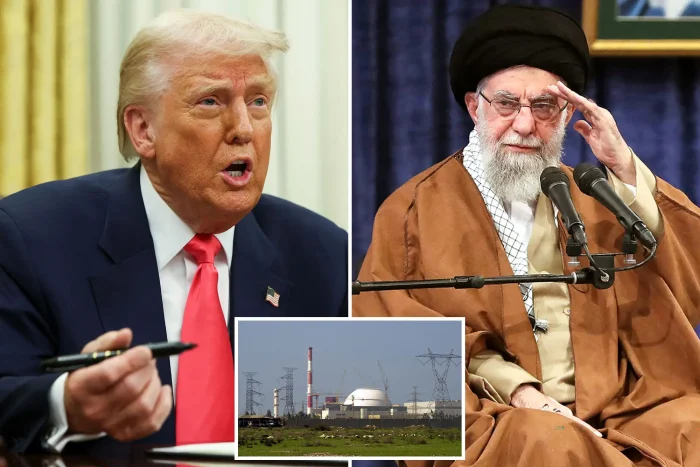
More Than 2,400 Protesters Killed in Iran as Trump Warns Against Executions.
Iran’s crackdown has entered its deadliest phase yet. More than 2,400 protesters have reportedly been killed and over 18,000 arrested as the Islamic Republic intensifies repression under a nationwide internet blackout now stretching into its sixth day. What began as economic protests has evolved into an existential challenge for the regime — and Tehran is responding with speed, secrecy, and the threat of executions.
The immediate concern is the fate of Erfan Soltani, a 26-year-old protester facing imminent execution after what his family and U.S. officials describe as a rushed trial without legal representation. His case has become a symbol of a broader pattern: fast-track death sentences, public trials, and intimidation designed to break the protest movement through fear.
Iran’s judiciary has made its intentions clear. Chief Justice Gholam-Hossein Mohseni-Eje’i announced that protesters accused of violence or “terrorism” will receive priority punishment, signaling that executions may soon become a routine tool of deterrence. Rights groups warn that the real death toll may be far higher as communications remain cut and families are silenced.
President Donald Trump has issued unusually blunt warnings, urging Iranians to keep protesting and cautioning Tehran that executions would trigger “strong action” from the United States. While the White House has not detailed its next steps, the language marks a sharp escalation — moving from condemnation to implied consequences.
Inside Iran, regime figures are attempting to reframe the uprising as foreign-backed “ISIS-style terrorism,” a narrative long used to justify mass repression. But the scale, persistence, and nationwide spread of the protests suggest something deeper: a population no longer deterred by fear, even as the cost in lives continues to rise.
Iran now stands at a dangerous crossroads. Executions may crush individuals, but they risk accelerating the collapse of legitimacy of a system already ruling through force alone. The question is no longer whether the crisis will deepen — but how far the regime is willing to go to survive.
Middle East
Trump Cancels All Meetings With Iran, Urges Protesters to Seize Institutions

President Donald Trump has crossed a decisive rhetorical and strategic line on Iran, canceling all meetings with Iranian officials and openly urging protesters to “take over” the country’s institutions as the regime’s violent crackdown intensifies.
In a series of posts, Trump framed the uprising not as an internal Iranian crisis, but as a moral confrontation between the Iranian people and a ruling system he now treats as illegitimate. By calling on protesters to keep records of “killers and abusers” and promising they will “pay a big price,” Trump signaled that accountability — potentially international and personal — is now central to US policy.
The numbers driving this escalation are staggering. Rights groups say at least 646 protesters have been killed, while Reuters cited an unnamed Iranian official putting the toll as high as 2,000. Internet shutdowns, mass arrests and live fire against demonstrators suggest the regime is fighting for survival rather than stability.
Trump’s decision to freeze diplomacy comes even as his administration confirms military options are actively under review. The White House insists diplomacy remains the preferred path, but the language has shifted sharply: Iran is no longer treated as a negotiating partner, but as a regime on probation.
International reactions underline the gravity of the moment. German Chancellor Friedrich Merz openly predicted the collapse of Ayatollah Ali Khamenei’s rule, arguing that regimes sustained only by violence are already in their final phase. That assessment, once fringe, is now voiced by mainstream Western leaders.
Strategically, Trump’s message is unmistakable. Washington is positioning itself not merely as a critic of Tehran, but as a potential catalyst for regime change — whether through internal collapse, external pressure, or both. The phrase “HELP IS ON ITS WAY” is deliberately ambiguous, keeping Tehran guessing while energizing protesters.
This marks the most direct US endorsement of popular uprising in Iran in decades. The risk is escalation — militarily and regionally. The calculation is that the regime is weaker than it appears.
Iran is now facing its most dangerous convergence: mass unrest at home, diplomatic isolation abroad, and an American president openly inviting the people to finish the job.
Middle East
US War Plans Against Iran Enter Advanced Stage

US Military Planning Against Iran Advances as Protests Intensify and Nuclear Talks Loom.
U.S. military planning for a potential operation against Iran has entered what officials describe as “advanced stages,” underscoring how rapidly the crisis surrounding Tehran is escalating. An anonymous U.S. official told Al Jazeera that American forces across the Middle East are now fully prepared for “any contingency,” as Washington weighs military options alongside collapsing diplomacy.
The warning comes amid Iran’s most serious internal unrest in decades. According to the Human Rights Activists News Agency (HRANA), at least 544 people have been killed in just over two weeks of nationwide protests, including hundreds of demonstrators and several minors. More than 10,600 people have been arrested, with many additional deaths still under investigation. Internet shutdowns and mass detentions suggest the Iranian leadership is bracing for a prolonged confrontation with its own population.
Against this backdrop, diplomacy is moving on two tracks. Iranian Foreign Minister Abbas Araghchi quietly reached out to Trump’s Middle East envoy, Steve Witkoff, to discuss the protests, signaling Tehran’s growing unease. At the same time, President Donald Trump confirmed that Iran has asked to resume negotiations on a new nuclear deal — even as he warned that Washington may “need to act” before any talks take place.
That contradiction defines the current moment. On one hand, Iran is seeking relief through negotiation. On the other, the U.S. is openly signaling readiness to use force. Trump’s blunt assessment — that Iran is “tired of being beaten up by the United States” — reflects a belief in Washington that pressure, not compromise, is driving Tehran back to the table.
The strategic calculation is clear. With Iran distracted by internal revolt, its deterrence weakened, and regional proxies under strain, U.S. planners see a narrowing window in which military action could reshape the balance of power. Tehran’s outreach for talks may be less a diplomatic opening than an attempt to buy time.
Whether this moment ends in negotiations or confrontation now depends on how far the protests spread — and how quickly Washington decides that diplomacy has run out of road. One thing is certain: the U.S.–Iran standoff has entered its most dangerous phase in years.
-

 Analysis11 months ago
Analysis11 months agoSaudi Arabia’s Billion-Dollar Bid for Eritrea’s Assab Port
-

 Interagency Assessment2 months ago
Interagency Assessment2 months agoTOP SECRET SHIFT: U.S. MILITARY ORDERED INTO SOMALILAND BY LAW
-
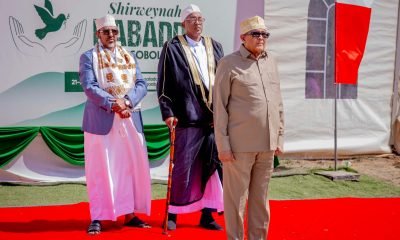
 Somaliland3 months ago
Somaliland3 months agoSomaliland Recognition: US, UK, Israel, and Gulf Bloc Poised for Historic Shift
-

 EDITORIAL1 year ago
EDITORIAL1 year agoDr. Edna Adan Champions the Evolving Partnership Between Somaliland and Ethiopia
-
Top stories2 years ago
Ireland, Norway and Spain to recognize Palestinian state
-

 Russia-Ukraine War6 months ago
Russia-Ukraine War6 months agoFibre-Optic Drones Shift Ukraine’s Drone Warfare
-

 ASSESSMENTS10 months ago
ASSESSMENTS10 months agoOperation Geel Exposes the Truth: International Community’s Reluctance to Embrace Somaliland as a Strategic Ally
-

 Somaliland1 year ago
Somaliland1 year agoSomaliland and UAE Elevate Ties to Comprehensive Strategic Partnership


